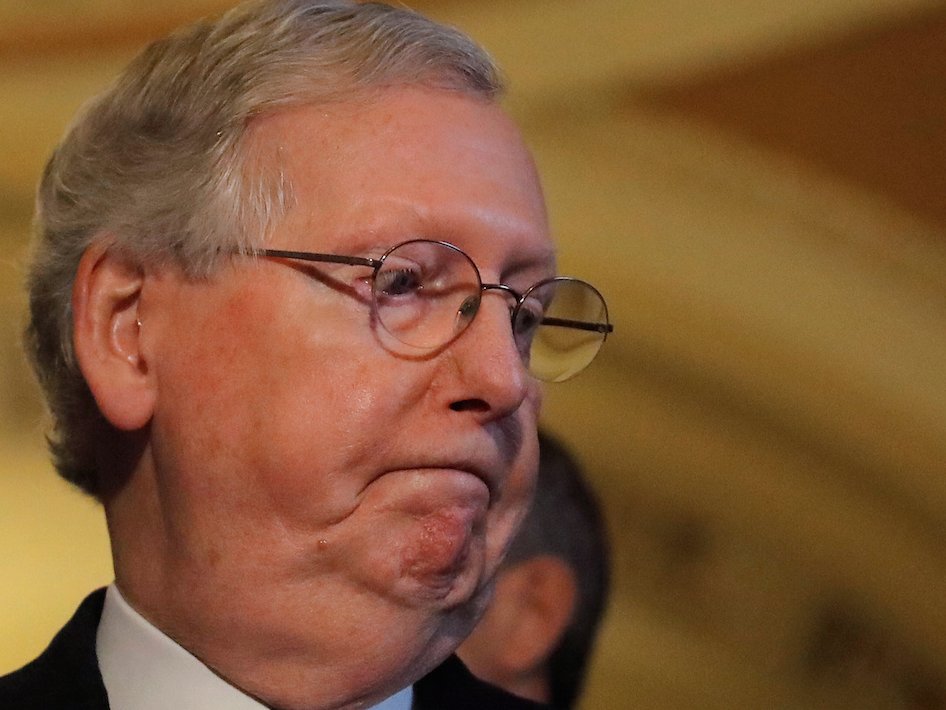 Reuters
Reuters
Senate Republican leadership released the updated version of its healthcare bill on Thursday, but continued pushback from its own conference likely puts the legislation in the same perilous position as previous iterations.
The details of the bill outline a variety of edits to the bill but indicate that much of the original BCRA is intact.
Here’s a rundown of what changes may be in the new version of the BCRA:
- Keep some of Obamacare’s taxes: The new version could preserve the 3.8% investment income tax on people making over $200,000 a year, a huge source of revenue from Obamacare and one of the biggest reasons Republicans wanted to repeal the law. Other taxes including one on health insurance executives and Medicare health insurance tax would no longer be repealed in this version. A number of smaller taxes, like one on tanning salons, are still repealed. This move would not sit well with conservatives and anti-tax advocates.
- Increased funding for the opioid crisis:The original bill had $2 billion in funding to combat the opioid crisis. The new version is expected to increase that number to around $45 billion.
- A modified Cruz amendment: A modified version of the Cruz amendment will be in the bill. According to the talking points, if an insurer offers a plan on the individual insurance exchanges that qualifies with all of Obamacare’s regulations, they can also offer plans off the exchange that do not adhere to those regulations. Additionally, the bill will include a fund to offset costs for insurers who sign up “high risk individuals” to the off-exchange, de-regulated plans.
- Allow people to use tax credits on catastrophic health plans: These high-deductible plans provide skinny coverage with three p xx. Under Obamacare, tax credits from the federal government were not allowed to be used on these plans since they did not adhere to the minimum standards for coverage.
- Increased funding for the state stability fund:This fund is distributed to states to help bring down premiums and start programs that lower costs for insurers and consumers. According to reports, there will be $70 billion of new money for this fund in the new version of the BCRA in addition to the $112 billion in the first version.
- Allow people to spend money from health savings accounts on premiums:HSAs, which are not taxed, can be spent on a variety of medical care costs. A new provision would allow it to go toward insurance costs.
While many of these changes address some concerns of GOP members, they likely won’t have a big imprint on the projected effects of the legislation, experts said.
“If the reported details of the revised Senate bill are right, it’s hard to see how it alters much the 22 million increase in the uninsured,” tweeted Larry Levitt, a senior vice president at The Kaiser Family Foundation, a nonpartisan health policy think tank.
The score from the Congressional Budget Office estimated the first version of the BCRA would result in 22 million more uninsured Americans by 2026 than under the current system.
The new version may not win Republican hold outs over
The biggest issue of concern: The new legislation reportedly does not address an approximated $772 billion in cuts to the Medicaid program through 2026. For many moderate detractors in states with large Medicaid populations, that could be a make or break issue.
Sen. Lisa Murkowski of Alaska has blasted the cuts, which would roll back Obamacare’s Medicaid expansion and cap the amount of funding the federal government provides.
“The ACA allowed for Medicaid expansion. The ACA didn’t address traditional Medicaid. … Why do we not focus on the urgency of the concerns with the ACA?” Murkowski told reporters Wednesday, according to Politico.
Other moderate senators like Susan Collins of Maine, Shelley Moore Capito of West Virginia, and Dean Heller of Nevada also expressed concerns about the new version preserving most of the Medicaid cuts.
On the other end of the GOP spectrum, conservative-leaning members have remained on the fence about their intentions.
Sen. Rand Paul of Kentucky told reporters during a conference call Wednesday that he would not support the bill even after the changes. Paul criticized the “kitchen sink” approach McConnell has taken to win over members by adding new spending to the legislation.
Instead, said Paul, the GOP should “narrow” the bill to a slim partial repeal of Obamacare, addressing the parts the on which the conference could agree.
And an amendment offered by Sen. Ted Cruz that would allow insurers to dodge certain regulations created by Obamacare will be tentatively added to the bill. That will likely help the legislation earn the support of Cruz and Sen. Mike Lee, but it could also help push moderates to oppose the legislation. On Wednesday, a group featuring some of the US’s largest insurers blasted the Cruz amendment, highlighting its potential effects on protections for people with preexisting conditions.
Majority Whip John Cornyn, the No. 2 Republican in the Senate, told reporters on Wednesday night that the bill does not have enough votes to pass. It can only lose two Republican votes. As of now, none of the 10 senators that came out publicly against the original version of the bill said they have moved into the “yes” column.













